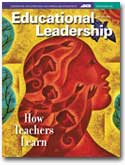September 2009
Teaching for the 21st Century
What does it mean to be well educated in the 21st century? What skills do students need to flourish in this complex, multicultural, technology-saturated world? Articles will discuss how schools are moving away from teacher-driven, textbook-centered, paper-and-pencil schooling toward environments that foster collaborative learning and engage students in complex, real-world work. How are schools promoting student creativity; critical thinking and problem solving; collaboration and communication; global awareness and multiculturalism; ethics and civic responsibility; and science, technology, engineering, and math?
Deadline: April 1, 2009
October 2009
Developing School Leaders
Leading a school has become so complex that it's no longer possible for principals to do it on their own. Schools need to embrace new and smarter ways of leading. How can principals empower teachers and staff members to become leaders? How do teachers collectively take responsibility for the well-being of the school? This issue will tackle innovative models of shared leadership and new and evolving leadership roles. It will discuss the kinds of supports that school leaders need to hone their skills and remain energized to lead in difficult times.
Deadline: May 1, 2009
November 2009
Multiple Measures: But What Kinds?
Educators know it is unwise to base all decisions on a single test and that teaching to tests rarely promotes good instruction. But how can we make sure that schools are accountable if many assessment measures are acceptable? This issue will consider the roles of teachers, principals, superintendents, and others in designing and implementing balanced assessment systems. Topics will include the connection between formative and summative assessments, assessment that promotes learning as well as measures it, the value of national and international assessments, and training in assessment practice.
Deadline: June 1, 2009
December 2009/January 2010
Health and Learning
Research tells us that healthy children learn more. This issue will look at how schools can forge a healthy environment—from creating school-based community health clinics to keeping physical education part of the school day; from implementing discipline policies that make hallways and classrooms free of physical or emotional violence to teaching students about nutrition and fitness; from helping students maintain a healthy body image to helping them avoid self-destructive behaviors. We also welcome research on the links among physical and mental health, student motivation, and achievement.
Deadline: July 1, 2009
February 2010
Meeting Students Where They Are
Kids come to school with varying abilities, interests, learning styles, background knowledge, and social and emotional needs. Topics in this issue will include identifying students' background knowledge, interests, strengths, and learning styles; overcoming challenging school structures that make it difficult to get to know students; accurately assessing students' current instructional needs; differentiating instruction to meet those needs; understanding and building on students' diverse cultural backgrounds; and connecting the curriculum with students' interests, goals, and passions.
Deadline: September 1, 2009
March 2010
Reading to Learn
Good readers can use their reading skills to gain knowledge of any subject. This issue will explore how teachers can help students learn to extract information and construct meaning from what they read, no matter what the subject is. What new or expanded reading comprehension skills are necessary in the 21st century? What can educators do to enable all students to learn from any kind of text they encounter, whether it's poetry or prose, fiction or nonfiction, on paper or online? We welcome submissions on teaching English language learners to read as well as strategies for older students who read below grade level.
Deadline: October 1, 2009
April 2010
Reconfiguring "School"
This issue will look at how schools can stretch the traditional model that confines learning to a six-hour day and five-day week—and to one building. Out of both necessity and conviction, many schools are reshaping or increasing learning time—through four-day weeks, year-round schooling, digital learning communities, and after-school programs. Others are expanding learning beyond the school building—through virtual schools, outdoor education, and place-based models that connect learning to the community. We welcome descriptions of successful practices, suggestions for new models, and analyses of why schools need to think beyond the traditional.
Deadline: November 2, 2009
May 2010
How the Teaching Profession Is Changing
How is the education profession changing? This issue will explore teacher recruitment and retention, teacher evaluation, career paths, and other policies that help teachers succeed and encourage professional growth. What is being done to bring the best teachers into the classrooms where they are most needed? How are schools helping both new and veteran teachers flourish and grow in their careers? What kinds of incentives spur teachers to improve? What new abilities and expectations are the younger generation of teachers bringing to the profession? Special Section: Teacher unions and the role they play in changing the teaching profession.
Deadline: December 1, 2009

